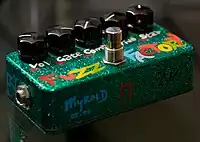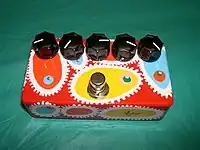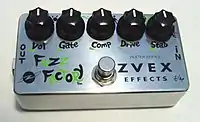| Z.Vex Fuzz Factory | |
|---|---|
 | |
| Manufacturer | Z.Vex Effects |
| Dates | 1995– present |
| Technical specifications | |
| Effects type | Fuzz |
| Hardware | Analog |
| Controls | |
| Input/output | |
The Z.Vex Fuzz Factory is a fuzz pedal made by the American inventor and musician Zachary Vex of the Z.Vex Effects company.
The Fuzz Factory is based on the fuzz-tone of from the 1960s. Invented in the mid-1990s, the pedals are mostly handbuilt and painted in Minnesota, United States, with a budget line manufactured in Taiwan.
Custom Finishes

Each unit is handpainted, and while there is a stock design that adorns most models of the pedal, there have been several variations released in limited quantity, including sparkle finishes, kanji finishes (writing and labelling of controls are in Japanese kanji characters), Korean finishes (all controls labelled in Korean), and so on. These limited runs of custom paintjobs underscore the handmade, one-of-a-kind nature of the devices. From the earliest incarnations of the device in the mid-1990s, Jason Myrold painted all Fuzz Factories leaving the Z.Vex shop. Briefly during the mid-2000s the artist Laura Bennett assumed painting duties.
Vexter Series Fuzz Factory

In December 2004, Z.Vex released a new model of the Fuzz Factory, called the Vexter Series Fuzz Factory. The Vexter series differs from the Handpainted version in that it has a silkscreened enclosure and a shorter warranty period. This effectively lowers the price point, and makes both production easier for Z.Vex and allows the effect to become more accessible to musicians. The Vexter Fuzz Factory contains the same circuit as the original Fuzz Factory pedals, with the inclusion of modern touches such as an indicator LED and DC power jack for powering the fuzz with an adapter. As of August 2006, Vexter series Z.Vex pedal subassemblies are completed in Taiwan, but a large portion is still done in Minnesota.
Variations
Soon after the rise in popularity of the original Fuzz Factory, the Fuzz Probe was introduced. This version kept most of the circuitry the same, but added a voltage-sensitive copper plate affixed to, and extending downward from the bottom of the unit. This copper plate, hardwired to the 'Stab' control on the pedal, allowed for real time control by use of one's foot or hand. By varying the distance from appendage to plate, the self-oscillation effects of the Fuzz Factory (Probe) circuit could be tempered and played musically, similar to a Theremin.
Several newer effects makers, such as Death By Audio, have introduced products which exploit the feedback-loop characteristics in the same way as the Fuzz Factory. Japanese manufacturer Zoom released a self-oscillating/feedback loop-derived fuzz design called the Ultra-Fuzz, which some have likened to be a "poor man's" Fuzz Factory. In addition, circuit bending is now a commonplace technique among experimental electronic musicians, with the principles employed in the Fuzz Factory being extended to include almost any electronic device.
Fuzz Factory users
Notable musicians who have used the Fuzz Factory include:
- Jamie Rhoden of Title Fight
- Matthew Bellamy of Muse
- Vigilante Carlstroem of The Hives
- Dan Boeckner of Wolf Parade
- Stephen Carpenter of Deftones
- Buckethead
- Greg Camp formerly of Smash Mouth, currently of Defektor
- Lloyd Cole
- Sharin Foo of The Raveonettes
- Rivers Cuomo of Weezer
- Steven Drozd and Wayne Coyne of The Flaming Lips
- Liam Finn
- Robert Fripp
- John Frusciante of Red Hot Chili Peppers
- Billy Gibbons of ZZ Top
- Michio Kurihara of Ghost and Boris
- Scott Henderson
- Jack L. Stroem
- Mark Hoppus of +44
- Daniel Johns of Silverchair
- Stephen Malkmus of Pavement and The Jicks
- J Mascis of Dinosaur Jr.
- Trent Reznor of Nine Inch Nails
- David Sylvian
- Nels Cline of Wilco
- David Torn
- Annie Clark of St. Vincent
- Tim Wheeler of Ash
- Jack White of The White Stripes and The Raconteurs
- Dustin Kensrue of Thrice
- Tegan and Sara
- Alan Sparhawk of Low
- Drew Goddard of Karnivool
- Reine Fiske of Dungen and The Amazing
External links
- Zachary Vex's page on the Fuzz Factory, including a demonstration video.
- Harmony Central's review page on the Fuzz Factory